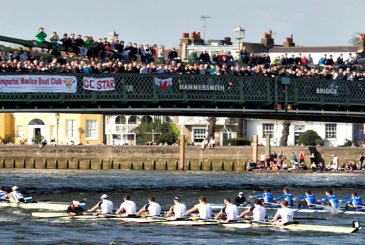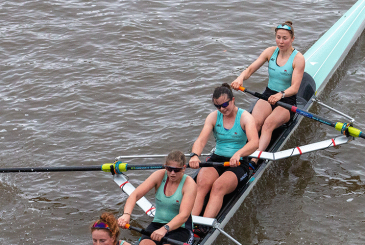There are many elements to running a successful regatta, from essentials like having enough portaloos and sticking to time, to matching volunteers with the roles they’ll be best at. Zoe Gullen finds out more.
Make the course attractive
Aside from multi-lane competitions, most regattas have to work with the stretch of water available to them. But the course can sometimes be adjusted, better to suit the competitors it attracts. The organisers of Hammersmith Amateur, raced on the Tideway with a free start, noticed that most races were decided within the first half, so shortened the course by approximately 400m. The new 1k course has made for closer racing and also increased capacity as more races can be fitted into the timetable.
Offer the right racing formats for your ‘market’
Many competitors do want the opportunity to race more than once, especially if travelling long distances or paying substantial entry fees. To this end, Kate Rennoldson of Auriol Kensington welcomes the time trial and finals of some multi-lane regattas: “You know you are going to get two races.”
Plate events for younger juniors are also popular, giving those new to the sport a second chance after being knocked out in the first round.
Events outside the standard British Rowing categories are an additional attraction. At City of Oxford, the sprint eights are raced in the lunch break and crews can enter on the day. The fast and furious racing is rewarded with handsome quart pots. Similar events run at Kingston, Bewdley and Sudbury.
Molesey’s Garrick Doubles, in which an inexperienced sculler teams up with an experienced crewmate, is another invitational event with enduring popularity, having run for well over a hundred years.
Entries – the value of communication
Robin Lush, entries secretary of Warrington Regatta, says, “If there is no opposition [for a crew], we will call and talk through options.” Jen Hinds, also on the organising committee, adds, “We can’t magic some up, but people appreciate the communication.” This means crews are not rejected out of hand and can prevent scratchings that cause an event to ‘collapse’ after the draw is published, when a club or crew decide it’s not worth travelling a long way just to race their clubmates or neighbours.
Stick to time
Keeping the regatta on time is essential. This starts with having a realistic timetable and enough boating space for the boat classes racing. Less experienced and larger boats may take longer to get afloat.
Racing in divisions helps to prevent delays, as crews can only race in one event per division, and also mean that events are completed within a fixed timeframe. At Oxford City, crews report to the pairing marshal on land before the race, boat with their opposition and row down to the start together, which also works to keep the regatta running to time.
Both Warrington and Hammersmith have adopted a ‘winner stays on’ format, with crews going straight back to the start to race their next round. Kate says that as crews only need to boat once, “It helps the smooth progress of the regatta, and from a competitor point of view, you turn up, you race and you’re done.”
Minimise parking stress
Robin comments that it is noticeable, and appreciated, when competitions have paid attention to parking arrangements. This reduces stress for trailer drivers and sets the day up for success. Warrington’s compact site can accommodate fourteen trailers, and clubs are permitted a maximum of two each. The club also works with local businesses to secure permission to use their parking facilities, and as a courtesy puts leaflets through the letterboxes of nearby houses, inviting them to the regatta.
Detailed directions, postcodes for satnav, What3Words and parking maps are a very helpful addition to regatta documents, as is information about any parking fees – why they are charged and by whom – and how to pay, so competitors know in advance whether they need to bring cash or register on a parking app.
Off the water
While the racing is the star of the show, successful regattas also pay attention to the land facilities. Toilets (and enough loo roll) are top of the list, and easy access to drinking water is important too.
Unsurprisingly, rowers, umpires and other volunteers are unanimous that good catering makes for a good regatta!
Prizes
Prize-givings add to competitors’ sense of achievement. Molesey has a prize-giving after each division, which winners are encouraged to attend and have their picture taken with the perpetual trophies. Those who need to leave earlier can collect their medals in advance. Thames Ditton does presentations throughout the day whenever crews are free. This means there’s more time to celebrate each winner, and lets them head off when they want, avoiding a traffic jam at the gate too.
However you do it, the important thing is to make the winners feel special: in 2023, Borne at Chiswick Bridge, run on the coronation weekend, added some fun to the proceedings as the prize-giving was attended by a cardboard cut-out of King Charles. Ensure there is a good backdrop for photos, and selfie frames can go down well too.
Well-considered prizes are popular, adding to the experience and being a lasting memento of the day or a special event. Molesey commissioned special medals for the 150th anniversary in 2017 and to mark the coronation in 2023. At Borne, all competitors and volunteers received a commemorative pin as a memento of the coronation regatta, while winners were given engraved glass tankards – introduced after the wooden medals tried out in 2022 were not universally popular.
And above all… people
Volunteers are critical to the success of the event, and it helps if they are visible, whether decked out in boaters and club blazers or in the hot-pink T-shirts of the Henley Women’s Regatta crew.
Ted Bates, secretary of Molesey, says that while “detailed organisation and very good budgeting” are key, “It is the team that counts.” Committee members and additional organisers volunteer their skills in a specific area. “Everyone is looking after something and making it work.”
Alongside this, good committees respond to feedback from competitors. Warrington has a wash-up meeting afterwards, and also sends out a post-regatta survey. Jen says, “It gives us the opportunity to see what we do well and what we can do better. We always score well on friendliness!”
The day itself is intense – “quite a blast”, as Ted puts it – so volunteers need to be well-briefed and not over-stretched. At Molesey, volunteers stay in post rather than having to get to grips with new things: “Landing stage people aren’t turned into timekeepers later in the day.”
And the more volunteers the better. Jen says, “We are constantly asking people to help. We get their availability, what their strengths are. Everyone competing has to volunteer; we expect everyone to help.” It is a whole-club effort to make things literally run as smoothly as possible: “The lane up to the club is full of potholes. The weekend before, our volunteers get out there with shovels and wheelbarrows, and fill the holes.”
A small thank-you gift is always appreciated, particularly for volunteers who aren’t part of the organising club (if there even is one). This might be as simple as a bar of chocolate or a regatta pen. Andrew Blit, chairman of Sudbury ‘International’ Regatta, who has umpired across the country, notes that while it is appropriate that they are impartial third parties, “Umpires want to feel part of the team delivering the event. It’s important to feel valued.”
Measuring success
Ultimately, you know you’re doing the right things when clubs come back year after year!
More information for competition organisers
Check out all of our advice and information to help you run affiliated regattas and head races, including private matches, and download the British Rowing Competition Organisers’ Manual here >>
Photo: Bill Hiskett










